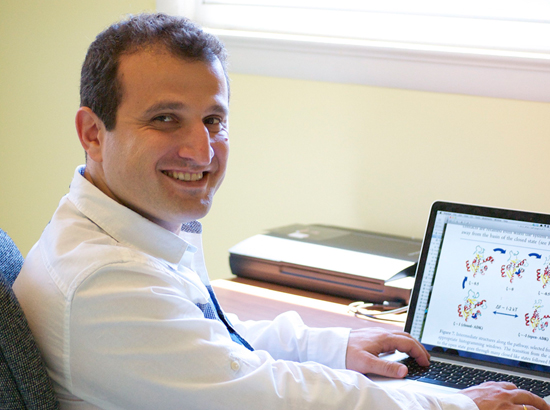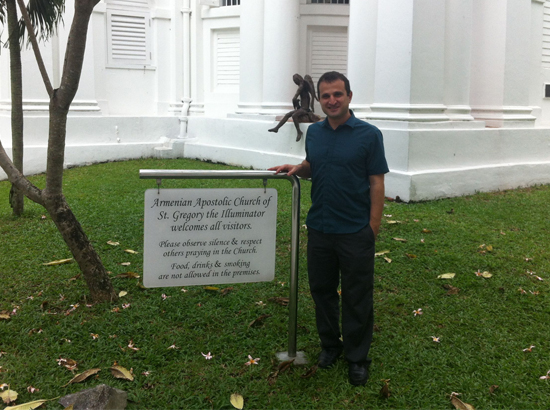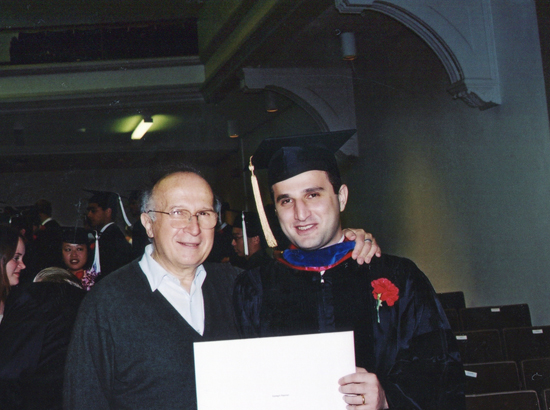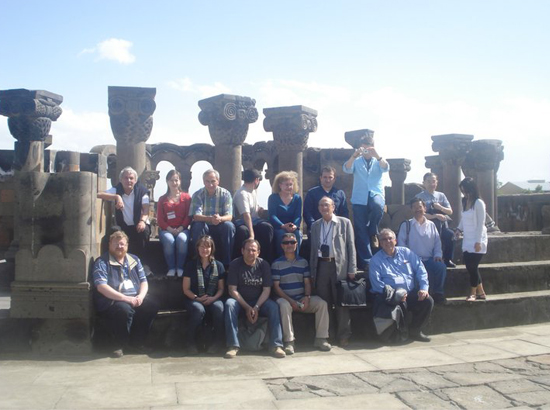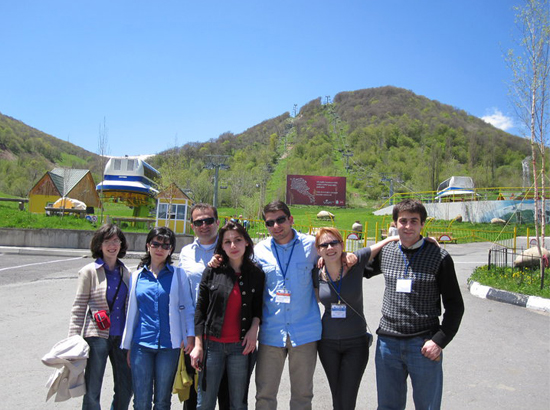Mediamax continues "50 Global Armenians" special project and presents its next hero, Garegin Papoian, Monroe Martin Associate Professor in the University of Maryland, U.S.
Garegin Papoian was born in Yerevan. In the fourth grade, he set off to Peru with his parents which he admits greatly influenced his views. After graduating from the Physics and Mathematics School in Yerevan, he went to Moscow as a prize-holder in All-Soviet Union Olympiad, in the newly established High Chemical College of Russian Academy of Sciences. After graduating the College, he went to study in the U.S. where he defended his doctoral thesis on quantum chemistry in Cornell University. He worked in Universities of Pennsylvania, California as well as University of North Carolina. Over the past 3 years, he has been working and lecturing in University of Maryland holding the position of the Associate Chair of the Department of Chemistry and Biochemistry Department. Garegin authored over 60 scientific articles in leading international magazines. His scientific expertise was marked with many awards including NSF CAREER and Camille Dreyfus Teacher-Scholar и Beckman Young Investigator, which are among the most prestigious awards for young scholars in the U.S.
I was born in Yerevan. I went to school after Tumanyan at the first three grades. But when I was in the fourth grade back in 1983, my parents were sent to Peru as engineers. In Lima, I studied at the school at the USSR Embassy for 2 years. I had excellent teachers here who were mainly spouses of diplomats. They traveled the whole world, spoke many languages and had broad mental outlook. It was there that I excelled at Russian language which allowed me to get acquainted with Russian classics and read specialized literature which wasn't always translated into Armenian. The best actors and directors of the Soviet Union, for instance, Leonid Filatov, came to us almost every week to show their latest films or performances.
On the whole, the experience in Peru greatly influenced my further development. Studying in the school at the Embassy broadened my knowledge as the environment was very favorable. There was an excellent library there, and I started reading many magazines on a regular basis: "Technique of the Youth", "Science and Life" and "Literary Newspaper". I was keen on science fiction and constantly dreamed about spacecrafts of the future. During my walks in the tropic Lima, my parents and I could speak about the politics in the Soviet Union and abroad, discuss culture, technology and science for hours. It was these talks and the environment that laid the foundations of my world-view and it was there that my future path was mostly determined. 
Nearby the Armenian Apostolic Church of St. Gregory in Singapore, that is the oldest Christian church in the country.
Photo from Garegin Papoian’s personal archive.
Upon returning to Yerevan, I studied for 2 more years in the school after Belinski and then was admitted to Physics and Mathematics School. I should note that teaching level in the school was rather high, I can state it was high at the global level. I came to realize that even more some years later when I had the chance to travel all around the world and start the career in the field of education.
I got interested in Olympiads and started participating in Olympiads of all the exact sciences. Taking the first places in the Mathematics, Physics, Chemistry and Biology Republican Olympiads, I was allowed to take part in the All-Soviet Union Olympiad but only in one discipline. Though I was stronger at Mathematics and Physics I chose Chemistry as I had been sure since early childhood I was going to be a doctor.
I took prize-winning places in the All-Soviet Union Olympiads of Chemistry in the 9th and 10th grades and took a training in the winter camp to get ready for international Olympiad. Under the decree of the USSR Minister of Education, all the six participants of the winter camp were allowed to enter any university of the country without entrance exams.
It was 1990. Presidium of Academy of Sciences and State Committee on Education of USSR decided to establish a new elite university in Moscow which would become a major forge of chemists for scientific institutes of the Academy. This is how the Higher Chemical College of Russian Academy of Sciences was set up and the teaching there was on the highest level. The 16-17-year-old students were taught a postgraduate course as all of the students were prize-holders of Olympiads. From the first year, we got seriously engaged in scientific researches and were given the chance to publish our first articles in foremost scientific magazines.
The educational program also comprised internships in U.S. In the third year, almost all of the students were sent to U.S. to take their internships and a part of them stayed there. As for me, I went back to Russia and left for the U.S. a year after graduating from the High Chemical College in 1994.
In the U.S., Garegin earned his master degree in the University of Kansas and then took his PhD defending his doctoral thesis on quantum chemistry in the Cornell University which is among the elite Ivy League in 1999.
I was extremely lucky to have Roald Hoffmann as the supervisor of my doctoral thesis. He is one of the most outstanding chemists of the 20th century and one of the founders of modern quantum chemistry for which he was awarded Nobel Prize in 1981. He is a genius who succeeded in both exact sciences and humanities. He also writes poems and plays. The four years that I worked with him were among the best experiences of my life. 
At graduation party with Roald Hoffmann, Nobel Laureate in Chemistry at Cornell University
Photo from Garegin Papoian’s personal archive.
During the last year of my postgraduate course, I met my future wife. Then we moved to Philadelphia when I worked in the University of Pennsylvania. Then we again moved, this time to San-Diego, where I worked in the University of California under the supervision of Peter Wolynes with whom we made several interesting discoveries. I got the job of an independent professor in the University of North Carolina in 2004 and I acquired academic tenure in 2010. Then I got an appealing offer to move to University of Maryland and accepted it. It's already the third year that I have worked as Monroe Martin Associate Professor in the Chemistry and Biochemistry Department and I am also the head of Postgraduate Course of the Department.
Though my doctoral thesis was dedicated to quantum chemistry, my interests consequently changed a lot, and I am mostly engaged in biophysics now. As a result of technological development, a new area, computer biology, was formed. Now we can model everything with the help of computers -from proteins up to whole organisms and ecosystems. But I should confess despite the big success, modern science is still on rather a primitive level. If we reach the level to be able to model on the level such as modeling of buildings, cars and aircrafts is held, it will allow us to find answers to many questions connected to medicine and urgent problems existing in the modern society. Of course, it's still a matter of distant future. We and many other groups currently create conceptual and technological bases for putting these ideas into practice.
We currently work out software packages for modeling of proteins, DNA and even whole cells. It's generally known that proteins carry out the vast majority of biochemical functions in our body. Many genetic diseases result from proteins mutations and if we are able to properly figure out what they are conditioned by we will be able to take up more effective measures to fight these diseases including cancer.
Garegin attends conferences and symposiums all over the world. He was going to leave for Barcelona and then to Beijing a week after our conversation.
With family at Oxford, 2012
Photo from Garegin Papoian’s personal archive.
I like attending conferences and seminars in various countries very much, I also love getting acquainted with different cultures, study, meet new people. One should constantly get in touch with people in science, otherwise you won't catch up with life. Unfortunately, it takes the precious time from connecting with family. I have two little children and naturally I would like to pay as much attention to them as possible.
Over the recent years, Garegin has visited Armenia almost once a year to set cooperation with Armenian scholars. In 2010, he co-organized the International Biophysics Conference in Tsakhkadzor.
With Tsaghkadzor conference participants in Zvartnots, May, 2010.
Photo from Garegin Papoian’s personal archive.
There is an Armenian National Science and Education Fund, ANSEF, and famous astrophysicist, professor Yervand Terzyan from Cornell University is one of the co-founders and chairman of the Fund. Over the toughest years, when there were huge problems with funding science in Armenia, ANSEF helped many scientists not only survive but create new projects and achieve international grants subsequently. My brother Ashot Papoian, who was included into the Board of the Fund, got me involved in the work as an observer to study the proposals on chemistry. I think there were many quite appealing projects and I liked following the development of careers of scholars who got grants from ANSEF.
Over the past years, I started interacting with biophysicists as well and I have a joint project with the YSU Biophysics Chair. Jointly with German scholars, they have recently held a conference in Yerevan and I was pleased to take part in it. I organized another international conference together with famous Armenian scientist Tigran Chalikyan who currently lives in Canada. Many scientists from Canada, Japan, Israel, U.S., Germany and post-Soviet Union countries gathered in Tsakhkadzor. This kind of conferences are useful for young Armenian scientists: it's extremely important to get to know with world-class scientists. 
With some of the students at the Tsaghkadzor conference in May 2010,
Photo from Garegin Papoian’s personal archive.
Undoubtedly, Armenia was one of the leading republics in terms of science during the Soviet Union period. Many Armenian scientists were internationally recognized in Armenia and outside its borders, they got prestigious awards and were selected into various academies. But much still remained- the human resource is still rather big and I see an important potential in this regard. It is clear Armenia is a country with limited resources which can't fully cover all the branches of science. But there may be some priority areas where Armenia will play a leading role on the international arena. I hope the efforts made by the government and society will create favorable conditions in the country and strategic planning in the science and education fields will be applied.
One can't start studying science seriously in a short-term perspective. To reach considerable success, you should dedicate the major part of your life. There should be conditions in Armenia so as the science was not an exotic thing but a normal career choice for young people who will be sure that choosing this path they will be able to properly support their family.
Garegin Papoian was interviewed by Aram Araratyan.









